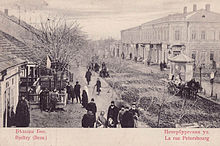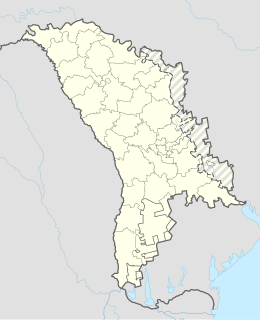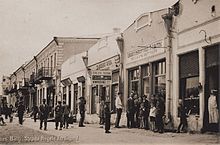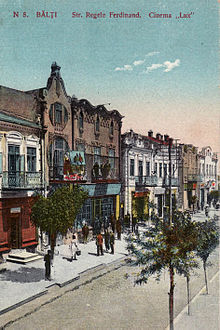Bălți
|
Bălți ( Rum. ) Бельцы ( Russian ) |
||
|
||
| State : |
|
|
| Administrative unit : | Munizip Bălți | |
| Founded : | 1412 | |
| Coordinates : | 47 ° 46 ′ N , 27 ° 56 ′ E | |
| Height : | 85 m. ü. M. | |
| Area : | 78.01 km² | |
| Residents : | 102,457 | |
| Population density : | 1,313 inhabitants per km² | |
| Telephone code : | +373 231 | |
| Postal code : | MD-3100 | |
| Mayor : | Renato Usatîi | |
| Website : | ||
|
|
||
Bălți [ ˈbəltsʲ ] ( ; Cyrillic spelling Бэлць; Russian Бельцы / Belzy ; German and Yiddish Belz ) with almost 102,000 inhabitants (2014) is the second largest city in the Republic of Moldova after Chișinău , if one considers the city of Tiraspol in Transnistria disregards.
Bălți is the most important industrial, cultural and business center as well as the most important traffic hub in northern Moldova. The city is located in the Bălți steppe , around 130 km north of Chișinău on the Răut River , a tributary of the Dnister . A multicultural and multilingual population lives in the city, the main languages being Russian and Romanian .
history

Bălți was first mentioned in 1421, when it was part of the Principality of Moldova . At the end of the 15th century it was destroyed by the Tatars under Khan Mengli-Girey (1467–1515), but then rebuilt. After the collapse of their rule in Podolia (1699), the Ottoman Gate settled loyal Polish-Muslim Tatars in nearby Lipkany , which was named after the Lipka Tatars .
In 1812, the Bessarabia region, and thus also Bălți, fell to Russia . Numerous Russians and Ukrainians soon settled in the region and Russian was introduced as the official and school language. Bălți in particular was one of the centers of Russian-speaking immigrants. On April 20, 1818 Bălți received city rights.
The city was an extremely important center for Jews in Bessarabia , in 1897 almost 56% of the then 18,500 inhabitants of Bălțis were Jews, compared to 23% Russians and Ukrainians and 17% Romanians and Moldovans.
In 1918 Bessarabia became part of Romania . The Russian-speaking population groups in the region were then exposed to an intensive policy of Romanization. In 1940, as a result of the German-Soviet non-aggression pact , Bessarabia was annexed by the Soviet Union and part of the new Moldovan Union Republic .
During the Second World War, the city was captured by Romanian troops on July 9, 1941. Most of the Jewish community in Bălți was subsequently abducted or murdered. On March 26, 1944, the city was retaken by the Red Army and was then part of the Soviet Union again. Bălți suffered severe damage during the war, and a large part of the historical structure was destroyed.
After 1945, instead of reconstruction, the main focus was on redesigning. On a large scale, new city districts were laid out in the prefabricated building style and industrial companies were established. The population recovered quickly and in 1959 was almost 68,000 - twice the figure in 1930. At the end of the 1960s, the 100,000 mark was exceeded. Since the collapse of the Soviet Union in 1991, the city has been part of the now independent Republic of Moldova .
As in many former Soviet republics, Moldova, and thus also Bălți, experienced a phase of economic and demographic decline in the 1990s. In the meantime, however, the situation has improved again.
The sights of the city include the Sf. Nicolae Church , the Constantin si Elena Church , the Alecu Russo University and the Vasile Alecsandri Theater .
The proportion of the population of the Russian or Russian- speaking minority in Bălți is above average. Bălți is now a bilingual city. Due to the demographic conditions, the place is considered a stronghold of the Russia-friendly parties. In the local elections in 2015, parties belonging to the pro-Russian spectrum received around 86% of the votes in Bălți. Renato Usatîi was elected the new mayor of the city with around 72.5% of the votes and replaced the long-time incumbent Vasili Panciuc , who was no longer running for election.
Cityscape


Bălți-Leadoveni Airport is located about nine kilometers northwest of the city . The airfield Balti City and a heliport located in the city and are mainly used for regional traffic. A trolleybus network has existed in the city since 1972, which covers local public transport and currently comprises five lines. There are also rail connections to other parts of Moldova and neighboring countries.
Bălți is mainly home to the electrical and food industries and is both an industrial and university town ( Alecu Russo State University Bălți ) with a cultural center, art galleries, theaters and a cultural palace. A large number of craft businesses of all sectors, especially in the construction sector, are available in the city. Window and facade construction is strongly represented.
The old Jewish cemetery of Bălți is on the edge of a simple residential area in the northwest. It is the second largest Jewish cemetery in the country.
population
The city had about 102,000 inhabitants in 2014.
Existing census data
The Băler population development according to the available census data:
| year | 1897 | 1930 | 1959 | 1970 | 1979 | 1989 | 2004 | 2014 |
|---|---|---|---|---|---|---|---|---|
| population | 18,500 | 30,600 | 67,666 | 105.505 | 126,950 | 161,475 | 127,561 | 102,457 |
Note: The first census was carried out in 1897; In 1930 there was a Romanian census; Soviet censuses were conducted in 1959, 1970, 1979, and 1989.
Ethnic structure in 2014 :
| Ethnicity | number | % |
|---|---|---|
| Romanians / Moldovans | 59 897 | 58.4% |
| Ukrainians | 17 450 | 17.0% |
| Russians | 15 146 | 14.7% |
| Bulgarians | 179 | 0.1% |
| Gagauz | 122 | 0.1% |
| other | 1595 | 1.5% |
| undeclared | 8030 | 7.8% |
Russian is the most widely spoken language in the city. In 2004, 53.9% of the population stated Russian as their most used language, Romanian (42.66%), Ukrainian was mentioned by 3.03% of those surveyed, 0.4% preferred other languages. In fact, most of Bălți's residents are bilingual and speak both Russian and Romanian. Both languages are common in everyday life and on the streets.
Others
In the famous Yiddish song Mein Schtetele Belz , Bălți is sung about .
The football club FC Zaria Bălți plays in the highest Moldovan football league and plays its home games in the Stadionul Olimpia Bălți .
Eugenio Coseriu (1921–2002), an important linguist , attended school in Bălți (now Colegiul Ion Creanga ).
sons and daughters of the town
- Leonte Răutu (1910-1993), Romanian communist politician
- Colea Răutu (1912-2008), actor
- Alexei Maximchuk (* 1958), Russian admiral
- Roman Grinberg (* 1962), musician
- Tali Ploskov (* 1962), Israeli teacher and politician
- Marian Lupu (* 1966), politician
- Oleg Borschtschewski (* 1969), Russian pop singer
- Vasile Sănduleac (* 1971), chess player, referee and trainer
- Sergei Aksjonow (* 1972), politician in the Crimea
- Elena Gorohova (* 1972), biathlete and cross-country skier
- Geta Burlacu (* 1974), singer
- Natalia Barbu (* 1979), singer
Town twinning
See also
Web links
- Official website of the Municipality of Bălţi (Russian / Romanian)
- Public website of the city of Bălţi (German / Russian)
- Photos by Bălţi
- My Schtetele Belz recording with Chava Alberstein
Individual evidence
- ↑ http://demoscope.ru/weekly/ssp/rus_lan_97_uezd.php?reg=69
- ↑ http://www.cec.md/r/rez_t1_2015/
- ↑ Archive link ( Memento of the original dated November 25, 2007 in the Internet Archive ) Info: The archive link was inserted automatically and has not yet been checked. Please check the original and archive link according to the instructions and then remove this notice.
- ^ Moldova: administrative structure (districts and municipalities) - population figures, graphics and map. Retrieved May 9, 2018 .
- ↑ http://www.statistica.md/recensamint/Populatia_toate_recensamintele.xls ( Memento from November 24, 2007 in the Internet Archive )
- ↑ Volkstelling in het Russische Rijk
- ↑ http://www.statistica.md/recensamint/Nationalitatea_de_baza.xls ( Memento from November 24, 2007 in the Internet Archive )
- ↑ http://www.statistica.md/pageview.php?l=ru&idc=263&id=2208
- ↑ https://www.yadvashem.org/yv/en/exhibitions/communities/balti/mein_shtetle_belz.asp Origin of the song. Retrieved November 29, 2019
- ↑ http://novostipmr.com/ru/news/13-06-06/odnim-gorodom-pobratimom-u-pridnestrovskoy-stolicy-stalo-bolshe






